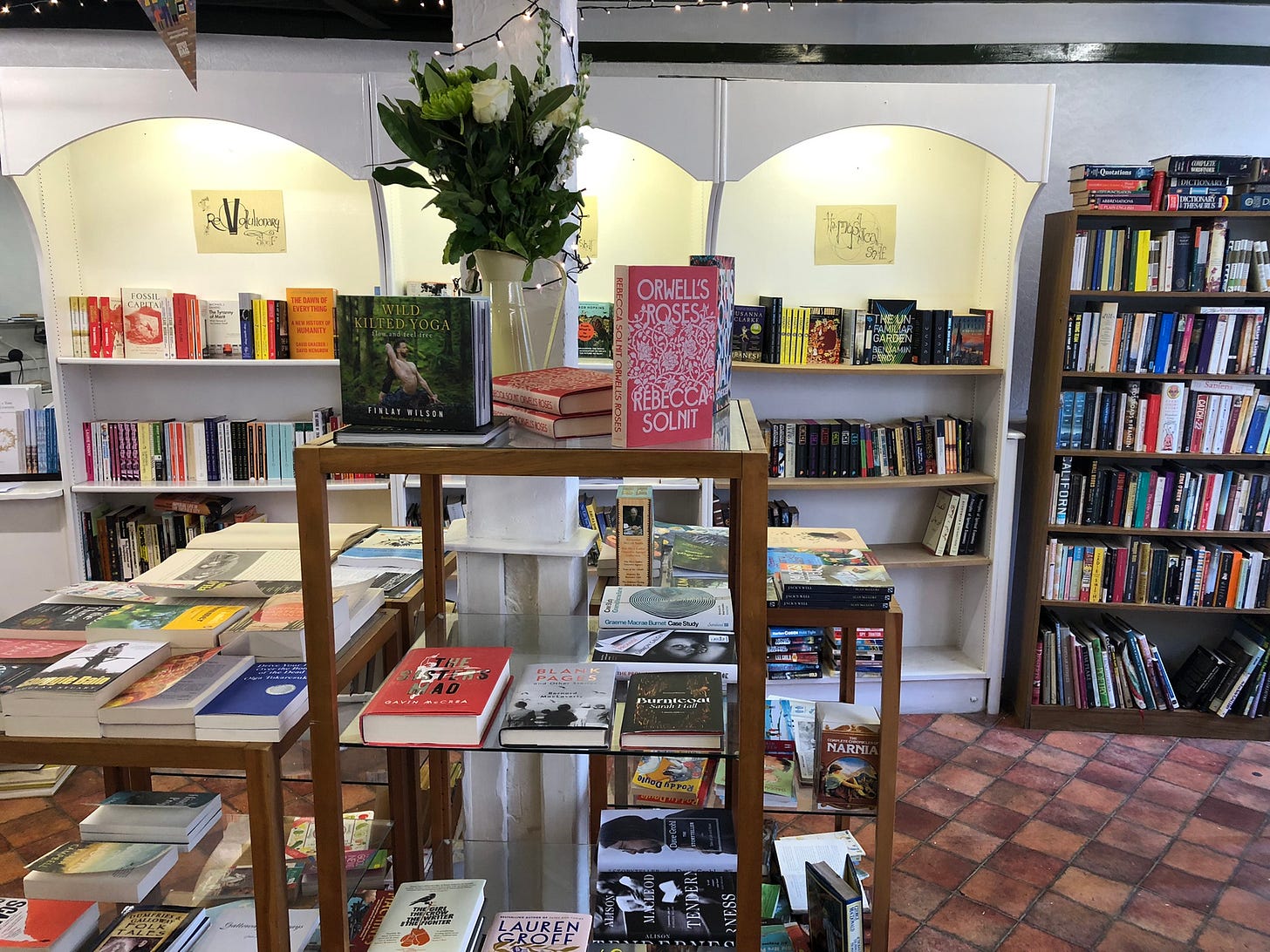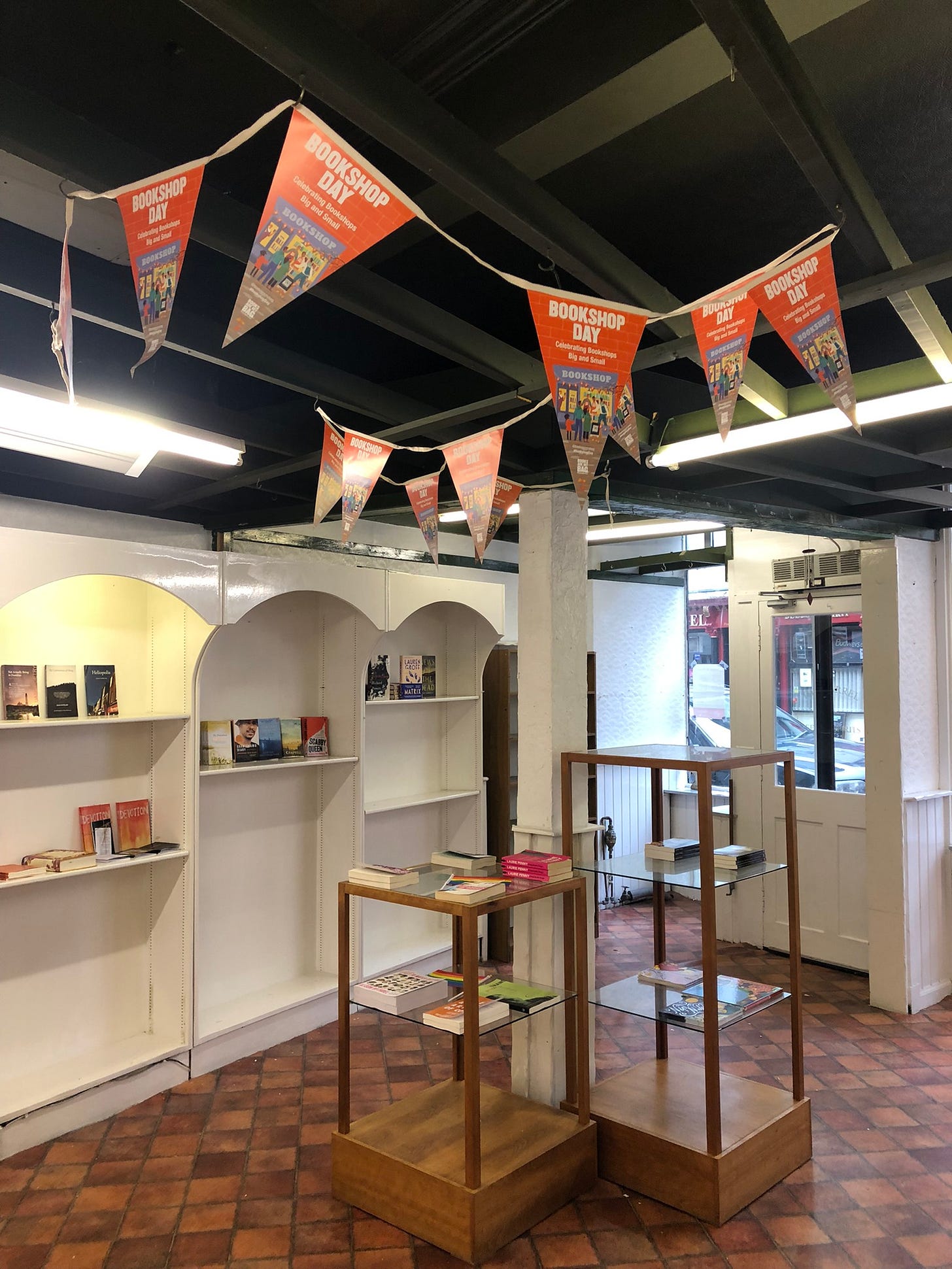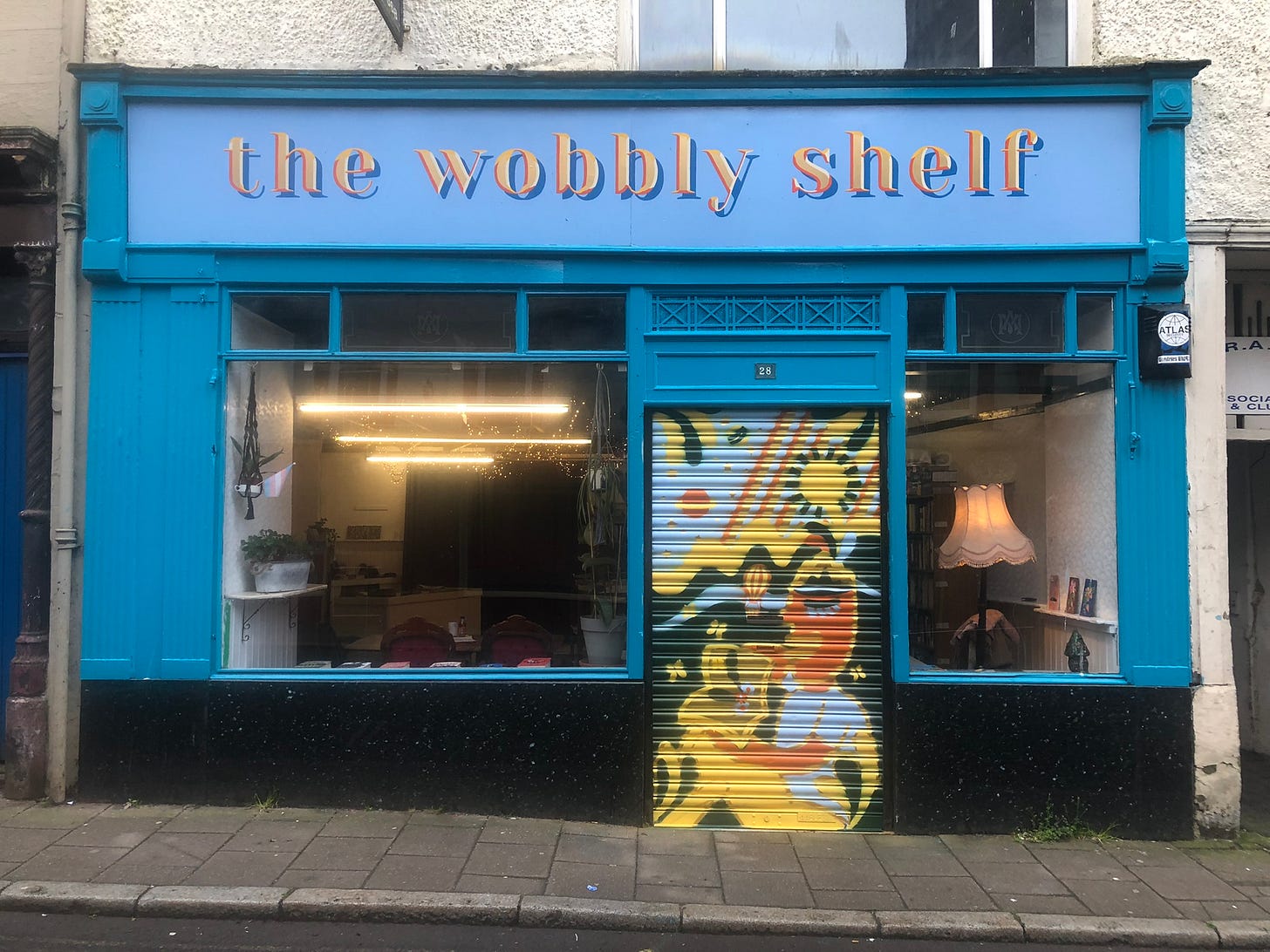Running a bookshop was something that I had dreamed about for many years and never thought would actually happen. Shortly after the pandemic struck, I began work as Bibliographer for Atlas Pandemica, a creative research project carried out by a group of ten artists in Dumfries and Galloway, Scotland. While walking along the River Nith with the project’s leaders in the summer of 2020 and discussing the myriad possibilities that our open-ended project made available to those working on it, I told them that I hoped to open a bookshop in Dumfries one day. Rather than laugh (as I would have done if the roles were reversed), they responded with words of encouragement, saying ‘that’s a great idea!’ What a gift it is to have people in your life who encourage your wild ideas. Or is it?
One year later, with Atlas Pandemica (but not the pandemic) coming to a close, I decided to take my bookshop idea a bit more seriously. I originally came to Dumfries on a Fulbright award in 2018 for the MLitt Environment, Culture and Communication course at the Crichton. What attracted me to the course, and to Dumfries, was the idea of local literary community fostering a sense of place, something many researchers suggest is essential to addressing the climate crisis and organisations like The Stove Network were actively engaging in. The highlight of my studies was helping to produce Rubble Riot Chaos Brain, an anthology of poetry and prose from emerging writers in Dumfries and Galloway released in 2019. In 2021, some of the people who worked on the first anthology produced Quaranthology, a collection of works by local writers and artists (including myself) created during the first covid lockdown. After these accomplishments over my first three years in Dumfries, opening a bookshop seemed like the logical next step to me. I wanted to continue building literary community while finding a way to make cultural work income-generating and therefore sustainable. The previous projects had been self-funded and designed to break even, covering the production and printing costs but not paying the writers or editors - as is the model for most community writing anthologies. With community organisations like Midsteeple Quarter making retail space available to emerging social enterprises, I thought there was a lot of potential to work with them and make my bookshop dreams come true.
Before things started, they began to fall apart. Midsteeple Quarter was only interested in offering us weekend pop-up space at £400 per month. Selling books was not something that was easy to ‘pop-up’ and to add to the trouble, my friend who was going to co-found the business with me backed out. I was frustrated, disappointed and ready to give up. All that had materially been accomplished was registering The Wobbly Shelf CIC as a business and opening an (empty) bank account. I had no plan, no money and the glimmer of hope I had was gone.
Lost, I went on a silent prayer retreat to get some direction on what I should do. The retreat was wonderful and God’s message was clear: leave. Go teach, go serve others as a writer and teacher. Being a bookseller was not my calling. I listened, but only briefly. I wasn’t ready to give up on my ambitions.
I was driven by the idea of starting a social enterprise, a business that could have a positive social impact while also being financially sustainable - a way to keep my head in the clouds and my feet on the ground. There are lots of folks who say follow your dreams, your passion, etc - these are the same ones who encourage our wild ideas - but they don’t really say how doing so will be practical, especially from a financial perspective. There’s just a promise that things will work out. Leap from the window and hope a trampoline is down below, but you’ll never know until you jump, an inspiring mentor once told me. Knowing nothing about business, I decided that going to business school would fill the gap and allow me to truly follow my dreams. So, I enrolled at Strathclyde fully committed to building a social enterprise that empowered communities and engaged them with the place where they lived.
My plan seemed like a good one, but as is so often the case, things did not go according to plan. In August and September of 2021, as my course was just getting started, I was invited to run a pop-up bookshop for some friends organising events in town. While I still saw the idea of a temporary bookshop as highly impractical, this was an opportunity to sell a selection of books tailored to the events. My cost of getting started was low: a £12 public liability insurance policy, £16 Square card reader and about £150 of inventory. Not yet being setup with a wholesaler, I purchased some books direct from publishers at a discount but others from online retailers where I would have a 0% profit margin. It was an experiment and I was excited to give it a go.
At the events, I feared that there would be little to no sales and I would be out about £200, going home a failure. However, we ended up having about £200 in sales, enough to cover my costs and leave me with some remaining inventory for future events. It was the first time I had ever traded as a business and it was a good feeling to see things work out relatively well. I was hopeful to continue with these pop-up experiments while continuing with my studies.
Business school was a mixed bag. Of the rougly 40 students in my cohort, I was one of two who had chosen the ‘social enterprise’ track, so most of my classmates were solely interested in making money and only thought of social impact as a ‘nice to have’ if they thought about it at all. The same could be said of my lecturers. Worse, I was quick to learn that my ambitions of running a bookshop that served only a regional economy with no growth plans beyond paying a handful of staff did not quality as a business in the eyes of my lecturers. It was what they patronisingly referred to as a ‘me too business.’ Bookshops, restaurants, pubs, hair dressers, all of the businesses that line the high streets fell into this category. I was frustrated that what I struggled to do was judged trivial and would not be covered as part of my course.
At the same time, I was motivated by the initial pop-up events to keep going. I rented space with Midsteeple Quarter as well as Dumfries Market, dutifully hauling my inventory of books out to the high street each week. It was madness, but I was selling books, covering costs and starting to build up a social media following. This was what I felt was the ‘right’ way to run a business, it felt ‘organic’ rather than contrived - I was working hard and following my instincts - not really what they were teaching me in business school.
After only a few weeks of pop-ups, I was approached by Dumfries Historic Buildings Trust with the opportunity to use the retail space in one of their buildings just off the high street rent-free from October through January. How could I say no? I was stunned by the opportunity, especially after the disappointing experience with Midsteeple Quarter. This was the chance to actually give opening a bookshop a go with minimal risk. It was also an eye-opening insight into the fact that retail space could be had for little to no cost (at least in a town like Dumfries, where half of the shops on the high street sit vacant).
My plan was simple: continue working hard and following my instincts, with the goal of creating a financially and socially sustainable bookshop, publisher and writing centre. I wanted to be scrappy and make due with what I had, rather than try to present a shiny, inauthentic image. I felt that customers would appreciate the honesty. It was not easy. I moved into the space in October 2021 with only a few boxes of books. When I reached out to wholesalers, I learned that our business was too new to be offered credit and instead would have to buy our books with payment upfront. We received a meager 35% discount (compared with 50% or greater discounts reserved for chains like Waterstones) and did not have the luxury of 30-90 days to pay for or return our orders that the big shops had. Despite the unfair disadvantage, I invested my personal funds into building out an initial inventory of new books. It also didn’t take long before people started coming in and donating their books, something I never expected. I had figured if they wanted to donate books, they would take them to a chairty shop. This pleasant surprise was very encouraging for me, I saw it as real support from the community helping make this crazy idea a reality.
While slowly filling the shelves, I stayed open for business in an unoffical capacity and was glad to see at least one or two customers coming in and buying books each day. I was at the bookshop nearly every day and struggled to keep up with the growing business and my business school course work. I began to have thoughts of dropping out, knowing that if the business continued to grow I would have to choose between the bookshop and my course. The growing customer base and donations built up my confidence that I was bound for success. In November, I officially opened the bookshop and was full-steam ahead.
Only two months into having our retail space, we were successful in the council’s High Street Challenge Fund, being awarded grants to help cover rent and shopfitting. This meant I could stop using my phone and the Square card reader, but actually have a real POS system as well as buy a dehumidifier to stop the damp from destroying our books. But more impotantly, it also meant we could finally paint the shop sign that had read ‘The Flower Shop’ (the shop’s previous occupant) since our opening.
It also meant going from a 4-month pop-up to making an additional 1-year commitment with a new monthly rent payment. This was intimidating, while I knew the grant would cover part of the rent, it meant we as a business were now on the hook for the remainder of the rent. At this point, all revenue was being re-invested into expanding inventory and paying bills. If I wanted to start paying myself, sales would need to go up about four times. Commiting for one year was scary, because if I couldn’t pay myself in the next few months, I couldn’t make this work. I signed the new rental agreement knowing that I would do my best, but if sales did not increase to make this a sustainable business, then I would have to close it.
I started 2022 optimistically, so optimistic that I had taken the plunge and dropped out of my business course. I now devoted all of my waking hours to organising events, groups and social media marketing in addition to running the bookshop. I wanted to see our sales rise rather than stagnate, but instead they fell. This shouldn’t have been surprising, my expectations were far from realistic. January through March are notoriously slow for retail, especially in the bitter Scottish cold with pandemic restrictions still in effect. As we put grant funds into the new signage and shopfitting, perhaps giving the appearance of success, our business was dwindling and I was growing increasingly concerned.
One important thing I learned while running the bookshop was that most independent bookshops are run by retirees. They are not financially-sustainable businesses, but instead hobbies or passion projects. We should really be grateful that so many retired people put their time, energy and savings into running bookshops for their communities. I, however, was far from being a retiree and this knowledge left me with an unsettling sense of doom for my dreams of making a living from the bookshop. I gave myself until March to see if there were any signs of growth, but none came. I was mentally and physically exhausted. There was far more work to do than any one person was capable of and while I had friends and volunteers helping out here and there, I was the only (foolish?) person putting in 40+ hours per week without pay and I had reached the end of my rope.
At this point, I went from trying to build a social enterprise to trying to figure out the next part of my life and what to do with the bookshop. I needed an income, I needed to be able to pay rent and buy groceries without begging for handouts from family and friends. At the same time, I struggled to communicate to customers that the bookshop was failing. There were so many people who loved it and expressed their gratitude that I had brought an independent bookshop to Dumfries. I hated the thought of letting them down and taking away the only independent bookshop in town.
I searched among the people I knew for someone who might be able to take over the bookshop and keep it going, but I warned them that they had to have the time and motivation required - it was unlikely to make enough money to pay staff for quite some time. No one bit.
I was disillusioned with the idea of following my passion, it seemed to me that the only cultural institutions that managed to stay in business were run by retirees and/or funded by grants. The free market does not seem to embrace cultural institutions, at least not in rural, deprived towns of Scotland. I thought that opening a bookshop was a compromise with my passions to begin with. As a writer, I had quickly learned that even successful writers are usually getting by thanks to working partners, trust funds or additional jobs. I thought surely a bookshop would be a way to follow my passion while acknowledging financial realities. I was wrong. Now what?
Now that the bookshop had failed, it was easier to turn back to God and tune into His will. The message had not changed: I was to serve as a writer and teacher of God’s love. It’s not as if writing and teaching were things I didn’t enjoy, in fact I found both quite rewarding. I just needed to let go of my attachment to Dumfries and dreams of running a bookshop, publisher and writing centre. Instead, opening myself to a wider range of possibilities. The possibilities soon arrived and I accepted an offer to teach secondary English in Hawai’i with Teach For America. While my instruction will be on English, I hope that my example will be of God’s love. I also hope that this new blog will allow me to share how God is at work in my life through reflections on my experiences, thoughts and ideas in a way that is inspiring to others. It’s difficult to say goodbye to Dumfries, not so much the place as the people I have connected with here. However, I know it’s time for me to move on.
Just as I came to Dumfries without knowing where I was going or what I would do, I now journey to Hawai’i with equal unknowing. Looking back, one might conclude that I could have saved myself a lot of trouble if I had stayed in tune with God’s will, but I don’t regret my divergence for a second. I learned so much and created so many great memories. However brief the life of The Wobbly Shelf was, I think it served the community well and had a positive impact on the lives of many people.
What happens to the shop now? I’m not sure. There are some people with ideas and intentions to take the space in a new direction, but I don’t want to make a forecast. I’ll find out what happens alongside you.





